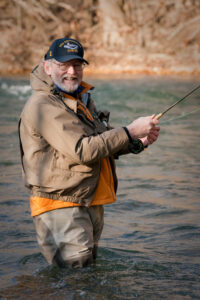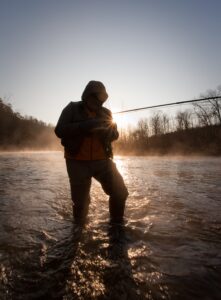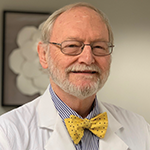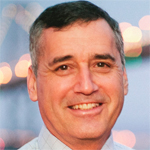
One of my early mentors: Richard Brasington Jr., MD, FACP, MACR, trout fishing in southern Missouri (circa 2013).
“When you get a good mentor, don’t let ’em be the one that got away.” Richard Brasington Jr., MD, FACP, MACR, told me this about a decade ago when I was a rheumatology fellowship applicant and first met him. It was clear the statement was influenced by his love of fishing. Dr. Brasington’s office was adorned with various mementos and reminders of this passion. Over the coming years, I got to learn more about him and he became a mentor of mine, albeit at his periphery. So when I learned in early May that the world had lost Dr. Brasington, I was anguished.
As I write this column, I am still processing the many aspects of grief that come with losing a mentor and a friend. Sadly, it is not the first time—nor will it be the last—that I have dealt with complex, profound emotions.
Through our eyes, our mentors seem eternal and god-like. They are repositories of wisdom and compassion; they are role models who seem to have infinite depth. But in truth, they are human beings with imperfections and limitations like the rest of us. They were not born the gurus we envision them, but came into being through relentless self-struggle and reflection. I want to share the wise words of four of the many, many mentors I’ve had. They have influenced my professional and personal life so profoundly that even in their corporeal absence they remain with me. I hope their wise words can influence your life, too.
Smiles
Mark F. Gourley, MD (deceased 2016), was a beloved rheumatology program director at the National Institutes of Health (NIH) from 2007 to 2013. I was a third-year medical student—an international one at that—living a nomadic lifestyle, moving from rotation to rotation in the hopes of eventually landing a residency. Because of the instability and insecurity that came with this, I was incredibly grateful to be at the National Institute of Arthritis and Musculoskeletal and Skin Diseases (NIAMS) for a full month.
I anticipated that I would be treated as an outsider because I came from a less prestigious place (few have ever heard of the island of Saba). Indeed, in my previous rotations, I was treated somewhat like an unwanted visitor. So I was pleasantly shocked and surprised that on my first day, Dr. Gourley personally showed me around the clinical center and introduced me to almost everyone in the division. In the days and weeks ahead, he specifically introduced me in conferences, built my self-confidence and instilled in me a sense of wonder about the world of clinical rheumatology. Of course, he didn’t need to—I knew how busy he was in his clinical and educational pursuits. Hardly anybody would have noticed if he had decided not to engage the lowly medical student. But he chose to.
‘Rheumatologists may not make the most money, but they make the most smiles.’ —Dr. Gourley
On the last day of the rotation, Dr. Gourley brought me to his office. He asked how the clerkship went and where I was going from there. And then he gave some sage advice about career development. I wondered if he had picked up on my desire to make the most out of my struggles from medical school. Maybe he sensed my enthusiasm about being in a rheumatology clinic.
“You have a lot of time to think,” Dr. Gourley said. “Consider our field. Rheumatologists may not make the most money, but they make the most smiles.”
Throughout the rest of medical school and the beginning of residency, I routinely communicated with Dr. Gourley and let him know about my adventures. He always replied with enthusiastic support. In fact, he wrote a letter of recommendation on my behalf for residency. Slowly, over time, we lost contact. I thought he had gotten busy. Certainly residency had made me busy, and he was orders of magnitude more occupied. I was shocked when I returned for an interview at the NIH in September 2013, and I didn’t see him. He had since retired and was focusing on his health. He passed away in 2016.
It hurt that I could not announce to him that I would become a rheumatologist. He passed away only a few months before my graduation. I had an email ready to send to him, thanking him for all the encouragement and support he offered when I felt at my most vulnerable. The draft still lies, unsent, in my mailbox. I would love to say that sense of regret goes away over time, but it doesn’t. Maybe that’s why Dr. Brasington’s words about not letting mentors get away stuck in my mind.
Although I never got to say goodbye to Dr. Gourley, I continually feel his presence in my day-to-day work. Dr. Gourley’s research in various autoimmune conditions means I think about his contributions a lot in clinic. As an educator, I have sought to incorporate many of his behaviors and attitudes. His keen recognition of the need to create a sense of belonging among learners of all levels has informed how I engage medical students, residents, fellows and others in the clinic and conferences. Further, his statement about smiles remains as relevant as ever. Rheumatologists should be known as members of “the happiest specialty,” and we should wholeheartedly strive to ensure we have enough support so we can spread those smiles.
Never Hurry
Of course, mentors are not confined to the field of rheumatology. Hanna W. Mawad, MD, FACP, FASN, CCD (deceased 2018), was internationally recognized as an expert in bone and mineral metabolism at the University of Kentucky, Lexington, where I completed my residency. He was also renowned for his wit and humor. I met him during my second month of residency. At that time, I was debating between rheumatology and nephrology as career choices. I confess that allergy/immunology was a very distant third. Dr. Mawad’s influence was so great he very well could have convinced me to become a nephrologist.
On my first day in the clinic, he disclosed the secret to clinical medicine: “Never hurry. The patient must know that their time is your time.” I squirreled that away as I spent valuable time working closely with him. In my second year, he was disappointed that I didn’t apply for nephrology, but was satisfied I had found my path. That act of maturity and acceptance was greatly appreciated.
One of the biggest reasons he was an exceptional mentor is that he brought great joy. One day, he saw me walking outside the hospital. He pulled over to the side of the road in his blue Corvette. “Get. In. The. Car,” he said, pseudo-menacingly. The other folks around understood the joke and we had a delightful high-speed ride past the horse farms of Lexington, as he gave a mini-lecture on the protein Klotho and the intricacies of continuous renal replacement therapy. It showed how much care and affection he had for his mentees.
Dr. Mawad is no longer with us, except that he is. His advice that “their time is our time” is an endless truth. Whenever we interact with somebody, whether it is a patient, a learner, a friend, or a family member, we are sharing time together. Respecting one another’s sense of time is one of the hallmarks of empathy. His words instruct me that this shared time must be of high quality and that we should strive to make every moment matter. This becomes even more salient when I realize I cannot consult with him anymore.
Unexpected Answers
Kentucky had another beloved giant who mentored an entire generation of internists. Robert Wilkins Lightfoot, MD (deceased 2022), was a venerable rheumatologist who had an expansive fund of knowledge yet exuded a homespun style. He seemed to know everything under the sun and could carry on a conversation about lupus nephritis as easily as a conversation about medieval Japanese armor. He had been the internal medicine program director years before I started at the university and was living a comfortable, enjoyable existence as a clinician educator within the rheumatology division.
I admired Dr. Lightfoot for many reasons but, as a resident, I found the most striking thing about him was his exceptional diagnostic reasoning skills. When faced with a difficult decision, he logically recapitulated all the options. He then weighed them and navigated through the uncertainty. Sometimes, by illustrating all the options, he illustrated how the decision was moot to begin with. As a resident physician, I found the efficiency with which he made diagnoses and initiated treatments a thing of beauty. Patients who were sedated in the intensive care unit with an uncertain diagnosis were, within the course of the week, on their way to recovery.
One thing he emphasized was that his knowledge didn’t drop from the sky. He was always reading and absorbing information, committing himself to growth at every single opportunity. Despite his braininess, his questions always came from a place of immense humility. When on rounds, he was always curious about patients and the totality of their lives. He asked unexpected questions. My co-residents relayed stories about interviews in which he posed such questions as, “What are these walls made out of? How would you know?” and “If a cat dropped in a forest, you think it would make a sound?” These eccentric questions often led to answers that questioned the roots of our beliefs. (Answers: The walls were made of tobacco—the cash crop of the upper South during the 19th century; if a cat drops in the forest, you shouldn’t be listening for sounds but running away.) For conversations like these, even after I left Kentucky for fellowship in Iowa, I always enjoyed seeing him at ACR Convergence.
I was anticipating seeing Dr. Lightfoot again in Philadelphia at ACR Convergence 2022. But it was not possible. I learned that Dr. Lightfoot passed away only a few days before the meeting. Apparently, he was teaching medical students and resident physicians from his bedside as a patient. It saddened me to hear of his passing, but I was comforted to know he maximized every moment to educate the world.
Pay It Forward
These are only four of the many mentors who instilled in me a sense of great fortune, gratitude and pride. At the same time, I recognize that I am not unique in having such mentors. If you look at your own experiences, I am sure you will find mentors of equal caliber who cared deeply about your well-being and your life. Juxtaposing that to the finality of death seems so jarring. But reconciling this dissonance is vital. We immortalize our mentors in the important work we do. We further their legacies when we affirm the lessons they have imparted. The burden of upholding their expectations may seem very high. Yet it is dwarfed when we look at their own careers. After all, they were mentees at some point, too. They were passing on knowledge and wisdom in a chain that appears to have neither a beginning nor an end.
With that said, as we approach the end of this column, I’ll return to the beginning with Dr. Brasington’s sage advice: “When you get a good mentor—don’t let ’em be the one that got away.”
 Bharat Kumar, MD, MME, FACP, FAAAAI, RhMSUS, is the associate program director of the rheumatology fellowship training program at the University of Iowa, Iowa City, and the physician editor of The Rheumatologist. Follow him on Twitter @BharatKumarMD.
Bharat Kumar, MD, MME, FACP, FAAAAI, RhMSUS, is the associate program director of the rheumatology fellowship training program at the University of Iowa, Iowa City, and the physician editor of The Rheumatologist. Follow him on Twitter @BharatKumarMD.



